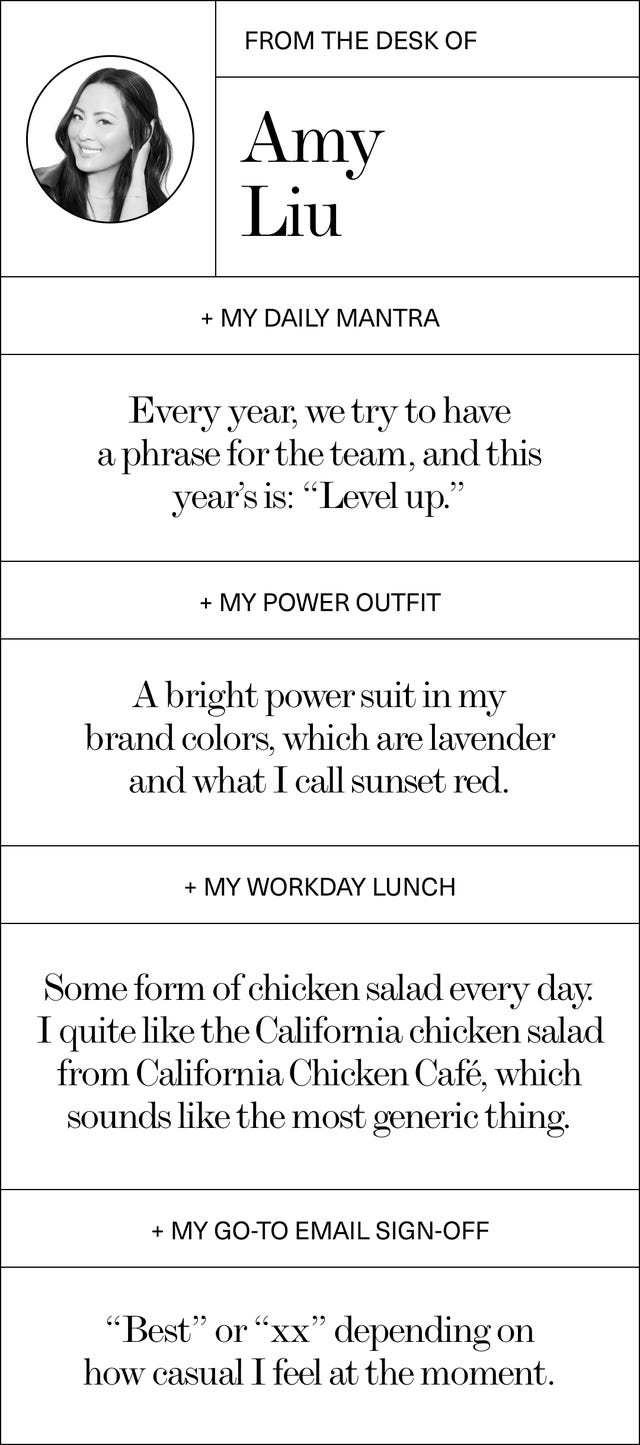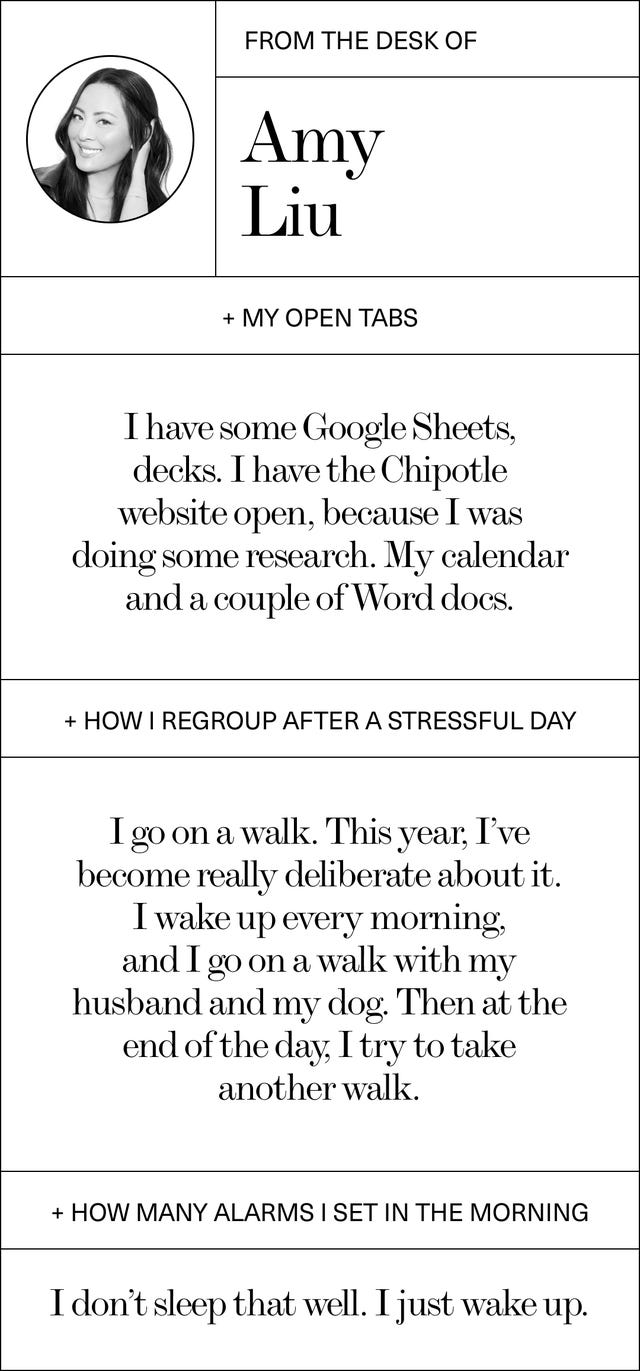Tower 28’s Amy Liu Is Determined to Run a Different Kind of Beauty Company

In ELLE’s series Office Hours, we ask people in powerful positions to take us through their first jobs, worst jobs, and everything in between. This month, we’re catching up with Amy Liu, the founder and CEO of Tower 28, who spent 20 years working in the beauty industry before starting her own brand. A favorite of Hailey Bieber and the National Eczema Association, Tower 28 has become known for fun skin care and makeup products for all skin types (especially sensitive). Below, Liu talks about her early doubts, the Mindy Kaling book that inspired her, and what she learned from telemarketing and hot cookies.
My first jobWhen I was in high school, I worked at Papyrus at the mall and wrapped gifts. If people bought the gift wrap, then it was a free service. It really taught me about how presentation is so important.
Then, in college, one of my first jobs was at ADP. I would go into, say, a taco shop and be like, “How are you paying your employees? Do you have under 10 employees?” My job was to find leads to bring back to the salespeople. That job was really cold calling in its purest form—walking in and having to talk to somebody who doesn’t want to talk to you. But also, under my desk, I had a little Otis Spunkmeyer toaster. The company would order frozen cookies, and I would [heat] them and package them to go, so I could go up to [potential leads] and say, “Hi, I have cookies for you.”
It was a really humbling job. Everyone should learn how to sell, because all your life, you are selling yourself. It forces you to think, What is it that this person needs? How do I figure out what their problem is? A professor in business school told me, “If you really want to do well, don’t sell a vitamin. Sell a painkiller.” A vitamin is nice to have, but a painkiller is a have-to-have. You have to actually create something that solves a problem.
My worst job
One summer, I worked for a manufacturer who made pop-up tents. They handed me a huge thing of business cards, and my job was to manually type up the contact information. It was terrible.
I also had another job in high school where I was a telemarketer/salesperson, under the guise of calling people to do surveys. There was a script we would have to go through, and it was competitive. The person who completed the most surveys in an hour got an extra bonus. It really taught me a lot about how to stay on the phone with someone, and to be friendly and engaging. A lot of people would say, “Oh, I’m eating dinner.” I would follow up with: “Oh, what are you eating for dinner?” It was a five- to six-minute survey, which is a long time to have someone on the phone. But I also learned how to let things go and move on to the next number.

How I got over my fear of leading a company
I was afraid to do something on my own. I didn’t think I could. I worked for other people and was pretty good at it. I was always a good student and good at getting the gold star. A part of me really wanted to know that I could [be an entrepreneur]. The founders I worked with were really smart, but I was like, “Oh, I don’t know that they’re like, so much smarter than me.” Mindy Kaling had a book called Why Not Me? and I was like, Yeah, why not me?
It took me a long time to figure out that I could. The story I kept telling myself was: If I work hard and get a seat at the table, at some point, I’ll learn enough so that I can be prepared [to become a founder]. Part of that is true—I am a better manager today because I understand so clearly what it’s like to be on the other side of things. But I was also able to build up a network where I met a community of people to ask questions.
Why I wanted to be an entrepreneur
My dad was an entrepreneur, and English was his second language. He did it because he didn’t feel like he could make a real living working for other people. He has said to me numerous times, “I literally moved to America so you didn’t have to do this.” Even now, he’s like, “Quit while you’re ahead.” I saw him be an entrepreneur with all the highs and lows. He loved it. But there was a financial crisis in the ’90s, and he had to close down his business. I watched him succeed, and then I also watched him fail. My mom, who was an auditor, left and came home at the same time every day. She never talked about her job. She didn’t care about it. Subconsciously, I was like, I want the job where you give a shit, and I’ll take all the highs and the lows of it. I wanted to feel engaged with what I was doing.
The importance of representation and visibility
A lot of times, I think that if you can do something, you should. Growing up, I didn’t see people who looked like me in business. A few years ago, Jamie Kern Lima, the founder of IT Cosmetics, gave a speech where she said to the people in the room and the industry: “All of you are responsible for beauty and the way people see themselves.” I still haven’t ever met her, but I’ve watched that video now a few times and showed it to my team.
I have been in the beauty industry for a long time, and I can imagine myself sitting next to a creative director, looking at an image, and saying, “Take down the crow’s feet. I don’t want to see her wrinkles.” I felt a responsibility to try and do something a little bit different, and show beauty with diverse images. I really do believe that you have to see it to be it. I do like to think that if people see me doing this as a person of color, then they think they could do it too.
Why you need to filter other people’s opinions
We had a logo and my brother, an architect, said, “This logo is kind of ugly. You should change it.” I was like, “You should have good taste!” He does have good taste in general, but he’s also not my demographic. I’ve heard other people say, “Blinders up.”
I had a manager who could not make decisions. You knew that the last person who had her ear was where she would be. But then, she would hear somebody else and go for that. You can see how crazy that makes people. For me, it’s not that you don’t have to listen, but you have to filter feedback based on someone’s perspective. But I do listen. I’m literally hiring all these people because I want their feedback. But that doesn’t mean I don’t filter it. If I listened to everybody, we would never move forward. For instance, there is someone on my team who barely wears any makeup. If I asked her to try a full face of foundation, and she told me it was too much coverage, I’d be like, Yeah, everything is too much coverage for you. But there are other things that she should definitely give feedback on.

I’m terrible at it. I am not an “inbox zero” person. I use [the email app] Superhuman, which helps a little bit, because it pulls out all the junk. Our internal rule is that conversations happen on Slack, and email is for large pieces of information or external [communications].
On our new partnership with the “CEO of blush”
Creating new shades with a content creator is a big deal for us—we’ve never done it before. Toni Bravo [is known on social media as] the “CEO of blush,” and she’s become a total authority on [it]. She had a genuine story of having to blend shades to find the perfect red berry and orange. She’s been a fan of our GetSet formula from day one. She has a genuine connection with her community and a really thoughtful perspective on what’s missing in the market. Inclusivity is everything for us, and Toni’s eye for color, love for bold pigment, and commitment to representation made her the perfect partner. She could instantly tell if something would go too ashy, blue, or even yellow. We went deep into the details of testing, swatching, and adjusting to get it just right. The goal was to create bold, joyful shades that still feel wearable and flatter a wide range of skin tones. I really think we nailed it. Plus, I love that we’re both proud L.A. girls.
My dream job
I’m doing my dream job. Any job is still called work for a reason. It is such a great privilege to do what I do every day. I get to make products that make people feel really happy and good and, in the best-case scenario, do save people’s skin. I get to have this team, and it’s all these things that I always thought I wanted, but it doesn’t mean that it’s always easy.
This interview has been edited and condensed for clarity.
elle









